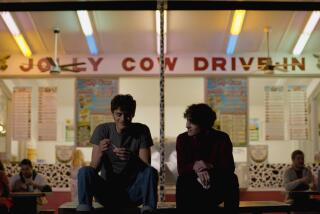MOVIE REVIEW : Woods Propels ‘Boost,’ Tale of an Addict
When he’s on a roll, James Woods is an actor who gives off such blasts of energy he can burn holes in your consciousness. Other actors dominate the camera with their looks. Woods--who has the gaunt face and blazing eyes of a character villain--intimidates it with mental and emotional pyrotechnics, plus suggestions of explosive rage.
In “The Boost” (AMC Century 14), he’s playing a desperate little Manhattan salesman who zooms to spectacular success in the Los Angeles tax-shelter market, becomes addicted to cocaine and throws his life away, dragging his beautiful, adoring wife Linda (Sean Young) down with him. Woods begins this role on such a high energy level you wonder where he’s going to take it, when his character gets hooked.
How can he suggest the over-the-top euphoria and raging paranoia of a cocaine addict when his character, sad, self-loathing Lenny Brown, begins like such a wild man? Yet Woods does build the performance, keeps driving it higher. Toward the end he gets to do a Nicholson-De Niro-style temper-tantrum aria: a cocaine-fueled blow-up at Morton’s. And he follows it with a magnificent, ashy-faced aftermath. Along with the improvised confession in “Salvador,” it’s probably one of the most moving single scenes he’s ever done.
It’s almost a great performance. But the “almost” is crucial. Director Harold Becker has a real flair for contemporary urban realism (“The Onion Field”). But “The Boost” seems chopped up, over-hectic, helter-skelter. Often the scenes don’t seem to build right, and we’re left with obvious points and thin ironies.
Like “Clean and Sober,” “The Boost” is a cautionary tale about cocaine abuse, and on one level it’s superior. It doesn’t go smarmy and self-congratulatory at the end; it holds a mirror up to white lines and wasted lives. But it’s addicted to some cliches of its own, a little bicoastal Los Angeles-to-New York masochism. Is Los Angeles a vast glitzy mousetrap baited with coke, easy sex and fast bucks? And is New York City the national center of temperance, tradition, drug-free deals, fine spaghetti parlors and fiscal sanity? Give us a break.
Darryl Ponicsan’s script is based on a book by Benjamin Stein (“Ludes”), which was about Quaaludes rather than cocaine. It has some vibrantly honest scenes and amusing digs, especially when Amanda Blake, Kitty of “Gunsmoke,” shows up as a raunchy old ex-hooker advising Lenny not to mix his chemicals.
But, at times, the story seems to be a fable not about about corruption and weakness but about how nice New York guys come to Los Angeles and go crazy. It suggests, perhaps unconsciously, that poverty is as much a crime or disease as drug addiction, that if Lenny had just hung in there, stayed with his kindly financial fairy godfather, Max (Steven Hill), he would be sitting pretty. (But the script also suggests he can’t, that he was a loser from the start.)
The movie keeps swamping us with shorthand morality. It travels out to the clean, salty beaches where the Browns revive, and surfers dream of Australia. And it has a villain, Joel (John Kapelos), a monster of glitz, who drags around a Teuton dominatrix of a stewardess (Kelle Kerr) and keeps popping up like a pie-eyed piper, leering and laughing and waving another toot of blow whenever we think Lenny and Linda have gotten straight.
Despite Sean Young’s sensitive performance as a constant victim, the main problem of “The Boost” is finding a steady moral base, other than hers, from which to criticize Lenny’s fall. And the last witness is the worst bicoastal cliche of them all: a compassionate New York emigre newly arrived in Los Angeles to write for The Times.
“The Boost” (MPAA-rated R for sex, drug use and language) still has something fine: the suggestion, however obscured, that honesty and love matter more than a crazy, burned-out pursuit of riches and pleasure. And it has Woods and Hill, infusing their best scenes with all the passion they can muster. These two give the film the boost it needs. When Hill’s Max takes Woods’ Lenny in his arms and fires him, it’s a withering comment on power, addictions, Los Angeles-vs.-New York and what happens when you race along the edge.
More to Read
Only good movies
Get the Indie Focus newsletter, Mark Olsen's weekly guide to the world of cinema.
You may occasionally receive promotional content from the Los Angeles Times.










